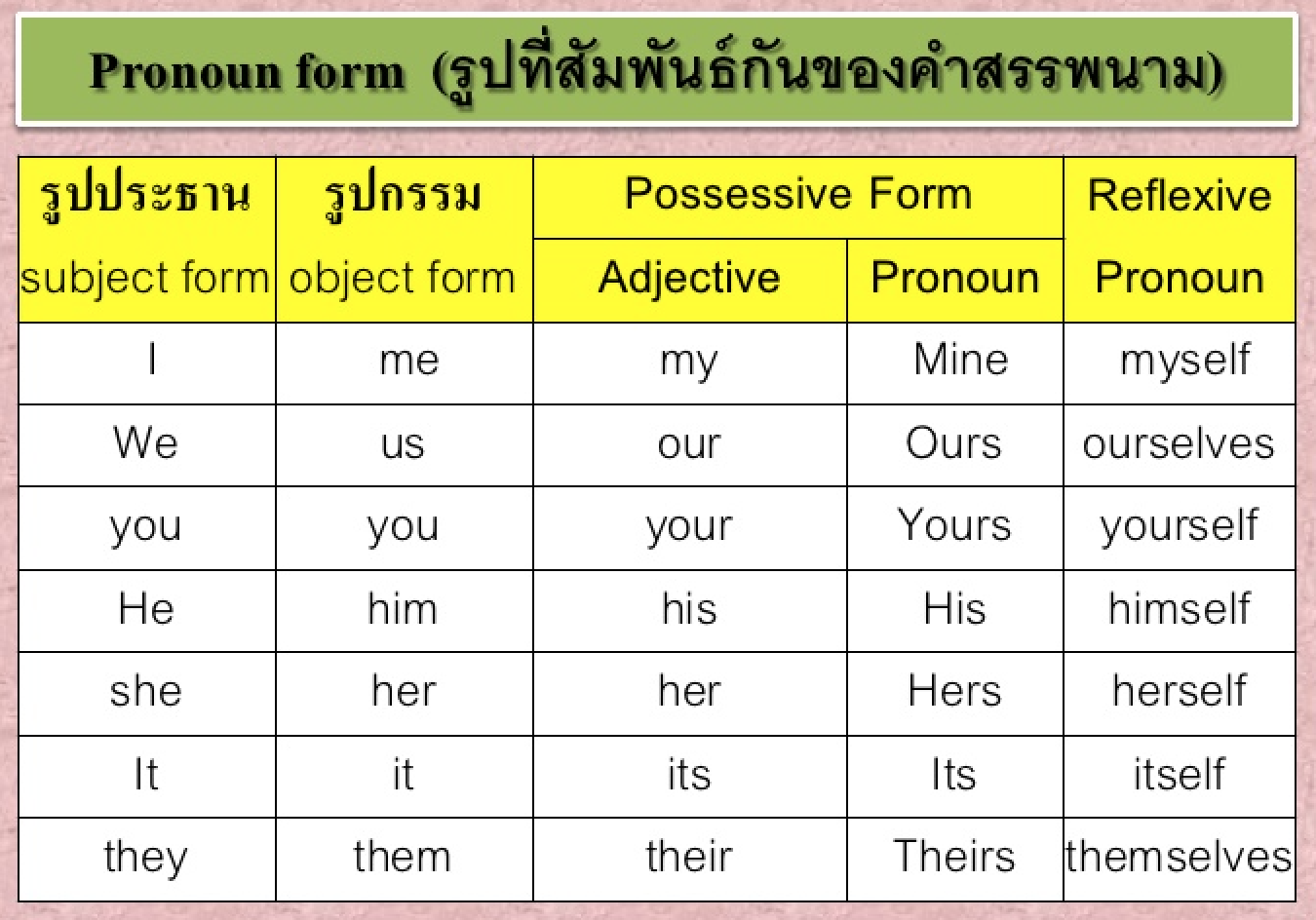Pronoun

Pronouns หมายถึงคำที่ใช้เรียกแทนชื่อ คน สัตว์ สิ่งของ เพื่อไม่ให้เกิดการกล่าวชื่อนั้นๆ บ่อยจนเกินไปนั่นเองค่ะ ซึ่งจะแบ่งได้ทั้งหมด 7 ประเภทด้วยกัน ดังนี้ค่ะ
1. Personal Pronoun (บุรุษสรรพนาม)
คือ สรรพนามที่ใช้แทนบุคคล หรือสิ่งของที่เราพูดถึง ได้แก่
บุรุษสรรพนามที่ 1 (ตัวผู้พูด) ได้แก่ I และ we
บุรุษสรรพนามที่ 2 (ตัวผู้ฟัง) ได้แก่ you
บุรุษสรรพนามที่ 3 (สิ่งที่เราพูดถึง) ได้แก่ he, she, it, they
เช่น John is an engineer.
เปลี่ยนเป็น He is an engineer. ในตัวอย่างข้อนี้คือ ใช้ He แทนชื่อคนหรือ John นั่นเองค่ะ
2. Possessive Pronoun (สรรพนามเจ้าของ)
คือ สรรพนามที่ใช้แสดงความเป็นเจ้าของ ได้แก่ mine, yours, his, hers, its, theirs, our วิธีการใช้ก็คือ สิ่งของ + V.to be + Possessive Pronoun
เช่น This car is mine. (รถคันนี้เป็นของฉัน)
This is our school. (นีาคือโรงเรียนของฉัน) เป็นต้นค่าาา
************ mine, yours, his, hers, its, theirs, ours **************************
คือ Pronoun นั่นคือทำหน้าที่เหมือนคำนาม แต่
*** my, your, his, her, its, their, our ********* คือ Possessive Adjective นั่นคือต้องมีคำนามก่อนถึงจะขยายได้ กล่าวก็คือ ต้องมีคำนามตามหลังเสมอนั่นเอง
เช่น My home, His jacket, our school. เป็นต้นค่ะ
แต่!!!!!!!!!!! his, her, its ไม่ว่าจะรูปของ Pronoun หรือ Adjective ก็เขียนเหมือนกัน ดังนั้นเวลาใช้ต้องดูประโยคดีๆ ด้วยนะคะ
3. Reflexive Pronouns (สรรพนามตนเอง)
คือ สรรพนามที่ใช้บอกว่าดัวยตัวของ…..เอง เป็นคำที่มี –self/-selves ลงท้าย ได้แก่ myself, yourself, himself, herself, itself, ourselves, yourselves, themselves
เช่น I wort it myself (ฉันเขียนมันด้วยตัวเอง) เป็นต้นค่าาา
4. Definite Pronoun (สรรพนามเจาะจง)
คือ สรรพนามที่บ่งชี้ชัดเจนว่าแทนสิ่งใด ได้แก่ this, that, these, those
เช่น That is interesting! นั่นมันน่าสนใจมาก(ซึ่งเป็นการย้ำถึงสิ่งที่ผู้พูดและพูดฟังเห็น)
These are joy home. นี่เป็นบ้านของจอย(เป็นการย้ำถึงสิ่งที่ผู้พูดและพูดฟังเห็น)
5. Indefinite Pronoun (สรรพนามไม่เจาะจง)
คือ สรรพนามที่ได้ได้เน้นเฉพาะว่าเป็นใครหรือสิ่งไหน ได้แก่ everyone, everybody, everything, someone, somebody, something, anyone, anybody, anything, each, another, either, one, no one, nobody, nothing, neither, others, many, several, both, few, all, more, most, some, such, any, none
เช่น Everybody loves him. ทุกคนรักเขา
Nobody is perfect. ไม่มีใครที่สมบูรณ์แบบ (ไม่ได้ชี้เฉพาะว่าใคร)
6. Interrogative Pronoun (สรรพนามคำถาม)
คือ สรรพนามที่ใช้ในการถามคำถาม ได้แก่ Who, Which, What
เช่น What happened! เกิดอะไรขึ้น (มีสิ่งที่เกิดขึ้นโดยที่ผู้พูดและฟังไม่ทราบว่าหมายถึงสิ่งใด)
Who is the man. (ใครคือผู้ชายคนนั้น)
7. Relative Pronoun (สรรพนามเชื่อมความ)
คือ สรรพนามที่ใช้แทนคำนามในประโยคหน้า และยังเชื่อมให้ประโยคสองประโยคมีความหมายไปในทางเดียวกัน ได้แก่ who, which, that
เช่น The girl who is crying was punished by her mother. เด็กผู้หญิงคนที่กำลังร้องไห้ถูกลงโทษโดยแม่ของเธอ (ใช้ who แทน the girl)
Exercise 0001
Give the correct subject pronoun. Choose from he, she, it, we, you, and they
1. the mother ___she_____
2. the cat ___________
3. the radio ___________
4. you and your friend ___________
5. you and I ___________
6. football and baseball ___________
7. the doctor ___________
8. he and his father ___________
9. New York City ___________
10. my sister and I ___________
11. money ___________
12. Mrs. Simon ___________
Exercise 0002
Complete the sentences with subject pronouns
1. My mother is a doctor. ___She_____ is Chinese.
2. Pat and James are dentists. ___They_____ are Canadian.
3. My father is a professor.___________is British.
4. Charles and I are teachers.___________are American.
5. Mr and Mrs Lee are musicians.___________are Japanese.
6. Mr Lara is a college student.___________ Colombian.
7. His wife is an artist.___________is French.
8. Miss Singh is a high school student.___________ is Indian.
9. My brother and I are soccer players.___________ are German.
10. She and her husband are factory workers. ___________ are Vietnamese.
11. The Johnsons are farmers.___________ are Australian.
12. Her sister is an Arabic teacher.___________is Egyptian.
Exercise 11(7)
Complete the following sentences with subject pronouns, present tense forms of be, and nouns.
- Occupations
1. _We_ are gardeners.
2. She _is__ a dentist.
3. I am an __architect__.
4. ____ is an English teacher.
5. You ____ doctors.
6. Pat and I are ____.
7. I ___ a ______.
8. Terry ____ an ____.
9. ______ are a student.
- Relationships
10. We ____ sisters.
11. _____ are classmates.
12. They ______ friends.
13. Tom and Jim are ______.
14. My family ______ from Brazil.
- Places and Things
15. _____ is a small country.
16. _____ is a radio.
17. ______ are big cities.
18. Toyotas and Hondas ______ cars.
Exercise 18(10)
Complete the sentences with the correct possessive adjectives.
1. Mr Ito is Japanese. _________ hometown is Osaka.
2. You are Panamanian. _________ family is from Panama City.
3. I am Korean. _________ hometown is Seoul.
4. She is French. _________ family is in Paris.
5. They are Chinese. _________ hometown is Beijing.
6. He is Moroccan. _________ family is in Casablanca.
7. We are Mexican. ________ hometown is Mexico City.
8. It is a Mexican company. ________ officer are in Monterrey.
9. Kathy and Mark are Australian. ______ parents are in Sydney.
10. Massoud and I are Iranian. ______ families are in Tehran.
11. You and Elena are Colombian. ______ hometown is Bogota.
12. Mrs Singh is Indian. ______ hometown is Calcutta.
13. Patrick is Irish. ______ family is from Shannon.
14. You and I are Kenyan. ______ hometown is Nairobi.
15. Miss Pavlov is Russian. ______ parents are from Moscow.
16. Mr and Mrs Clark are British. ______ hometown is in London.









